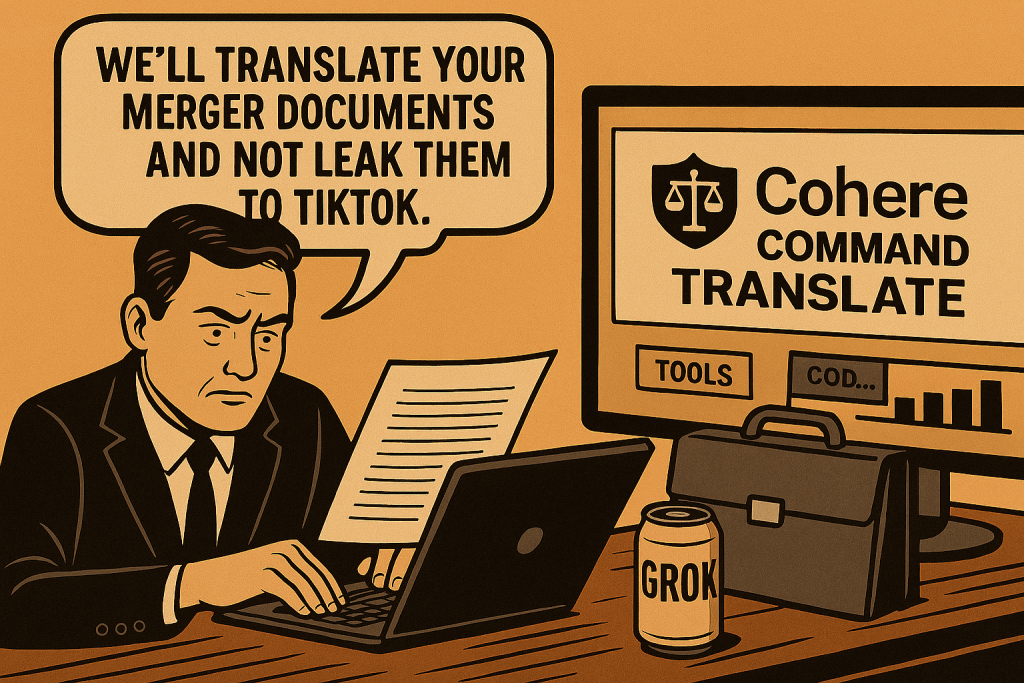August 28th: Three heavyweight model announcements. One calendar date. Coincidence? Or a coordinated flex in the AI arms race?

🚀 GPT-Realtime by OpenAI
Read the full release | Commentary from WinBuzzer | DeepLearning.ai discussion
OpenAI’s latest offering, gpt-realtime, is a speech-to-speech model designed for production-grade voice agents. It’s not just a voice model—it’s a full-stack conversational engine that processes audio directly, skipping the traditional speech-to-text pipeline.
🔍 Key Features:
- Natural-sounding speech with emotional nuance and multilingual switching
- Function calling with 66.5% accuracy on ComplexFuncBench
- Instruction following improved to 30.5% on MultiChallenge audio benchmark
- Supports image input, SIP phone calling, and remote MCP servers
- New voices: Cedar and Marin, optimized for expressiveness
💰 Pricing:
- $32 per 1M audio input tokens
- $64 per 1M audio output tokens
- 20% cheaper than GPT-4o-realtime-preview
🧃 Commentary:
WinBuzzer calls it “a leap in expressive voice modeling”, while DeepLearning.ai highlights its ability to handle non-verbal cues and language switching. It’s clearly aimed at enterprise-grade deployments—think customer support, education, and personal assistants.
Satirical Sidebar: OpenAI’s release reads like a TED Talk transcript—polished, visionary, and just a little too proud of its benchmarks. Meanwhile, Elon’s Grok team was already halfway through a tool call before OpenAI finished its press release.

🧑💻 Grok Code Fast 1 by xAI
Official release | Cline blog coverage | Times of AI analysis
Elon Musk’s xAI dropped Grok Code Fast 1, a model built for agentic coding workflows. It’s fast—like, “already called 12 tools before you finished reading this sentence” fast.
🔍 Key Features:
- Built from scratch for developer speed and responsiveness
- Mastery of tools like grep, terminal, file editing
- Optimized for IDEs and agentic platforms like Cursor, Cline, GitHub Copilot
- Cache hit rates above 90% with launch partners
- Supports TypeScript, Python, Java, Rust, C++, Go
💰 Pricing:
- $0.20 per 1M input tokens
- $1.50 per 1M output tokens
- $0.02 per 1M cached input tokens
🧃 Commentary:
Cline’s blog praises it as “so fast it changes how you work”, while Times of AI notes that Grok prioritizes speed over theoretical accuracy, arguing that fast loops beat slow perfection.
Satirical Sidebar: Grok’s release feels like a Red Bull-fueled sprint through a codebase. If OpenAI is the polished professor, Grok is the caffeinated hacker yelling “ship it!” before the test suite finishes running.

🌐 Command A Translate by Cohere
Official release | Slator enterprise analysis | Model card on Hugging Face
Cohere’s Command A Translate is a specialized model for secure, enterprise-grade translation across 23 languages. It’s not trying to be everything—it’s trying to be the best at one thing: translation.
🔍 Key Features:
- 111B parameters, optimized for translation quality
- Deep Translation: multi-step agentic refinement for high-stakes documents
- xCometXL score: 84.4 (best-in-class)
- Private deployment: run on 1 GPU with 4-bit quantization
- Supports 23 business languages, including Hindi, Hebrew, and Persian
🧃 Commentary:
Slator calls it “the new industry standard”, and Hugging Face confirms its open weights availability for research. It’s built for legal, financial, and enterprise localization—not casual use.
Satirical Sidebar: While OpenAI and Grok were busy flexing tool calls and voice agents, Cohere quietly walked in with a briefcase full of contracts and said, “We’ll translate your merger documents and not leak them to TikTok.”
🧠 Final Assessment: Who Wins the Day?
| Model | Strengths | Weaknesses | Ideal Use Case |
|---|---|---|---|
| GPT-Realtime | Natural speech, tool calling, SIP | Pricey, complex setup | Voice agents, customer support |
| Grok Code Fast 1 | Blazing speed, IDE integration | Less accurate on deep reasoning | Agentic coding, dev workflows |
| Command A Translate | Secure, precise, enterprise-ready | Narrow focus, not general-purpose | Legal, financial translation |
🧠 Verdict:
- OpenAI flexed its voice muscles and enterprise polish.
- Grok sprinted into dev workflows with caffeine and cache.
- Cohere quietly dominated the translation vertical with precision and privacy.
Final Satirical Note: If this were a pissing contest, Grok brought a firehose, OpenAI brought a fountain pen, and Cohere brought a notarized affidavit in 23 languages.

🥜 The Final Nut: Who Actually Won August 28th?
Three releases. One date. Zero chill. Everyone wins.
- OpenAI flexed its voice modeling with GPT-Realtime, delivering expressive speech, tool calling, and enterprise-grade integrations. It’s polished, powerful, and priced like it knows it.
- Grok Code Fast 1 from xAI came in hot—built for speed, optimized for agentic workflows, and already embedded in dev tools like Cursor and GitHub Copilot. It’s not trying to be perfect—it’s trying to be fast enough to change how you work.
- Cohere’s Command A Translate skipped the hype and quietly dropped a best-in-class translation model with enterprise privacy, open weights, and multilingual precision. It’s the grown-up in the room.
🧠 Strategic Takeaways:
- If you’re building voice agents or customer-facing bots, GPT-Realtime is your toolkit.
- If you’re coding fast and iterating hard, Grok Code Fast 1 is your new co-pilot.
- If you’re translating contracts, legal docs, or financial reports, Command A Translate is the only model that won’t leak your merger to Reddit.
For any questions or concerns comment below or Contact Us here.
Take a Look at Our Toolkit here on our Resources tab


Leave a Reply